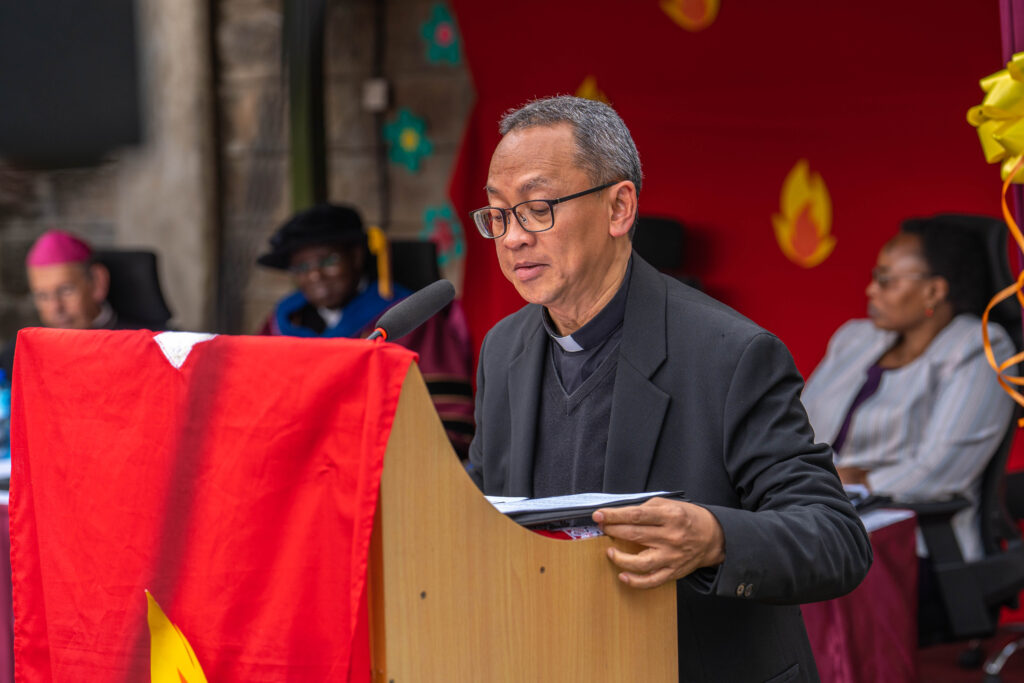
Just as I thought Hekima’s 2025-2026 Academic Year Inauguration could not get more prophetic, the ante was upped even further!
I was still taking in the words of Fr. Dr. David Neuhaus SJ’s powerful, eloquent, and calmly passionate address to us when Fr. Deshi Ramadhani SJ stepped up to the microphone to respond. An Old Testament scholar and retreat director at Mwangaza, Dr Ramadhani’s response felt like one prophet responding to another.
Instead of mirroring Neuhaus’ speech, something one expects at inaugurations, Fr. Ramadhani built upon what our Guest Speaker had said and laid down a series of further challenges.
Drawing on the Psalms of Ascent (Pss 120-134), and linking them to Neuhaus’s reflections on the Good Samaritan, he observed:
I imagine that the Levite and the priest in Jesus’ parable of the Good Samaritan also sing prayerfully Psalms 120 and 133. Still, perhaps, ironically, the ritual is just a ritual, and only encourages both the Levite and the priest not to stop at all.
As I listened, I couldn’t help but think back to the 1980s, when, as a member of the South African Catholic university student movement, I pondered the possibility of a vocation. I wondered whether religion was truly a force for change or simply a form of spiritual escapism. Indeed, by exploring the Jesuits, I was trying to escape myself.
Ramadhani continued:
The Good Samaritan, who is not allowed to go to Jerusalem simply because she is a Samaritan, takes a bold action that celebrates the beauty of both Psalms 133 and 120. For the Good Samaritan, stopping flows naturally from someone who remembers how it feels to be “forgotten” and “alienated” to a fellow human being who is also “forgotten” and “alienated.”
Once again, I thought back to many non-religious South Africans (some friends, most of them public figures) who had given so much for the cause of liberation. To outsiders, they embodied the best of the golden thread of religious traditions, manifesting witness and action for justice. They challenged many religious people to see their faiths not so much as sources or witnesses (let alone, God help us!, leaders) of the struggle, as what we called ‘sites of struggle’.
Fr Ramadhani’s challenge to us was clear. Do we, as religious professionals and those studying theology (or peace studies), knowingly or unknowingly privilege ourselves, claiming some higher ground to talk about God, to judge sins of commission but not our omissions?
His observation on the paradox that perhaps tribalism in Africa was just “another form of ‘European settler colonialism’ in a nice colourful garb”, while we may validly see contemporary Zionism as itself colonialism, was a case of missing our own blindness. I am sure he could have added many others.
This and his concluding questions,
Can we become “witnesses of hope”?
Can we work hard as “architects of transformation in the Church and society”?
Can this new academic year be evaluated by “a commitment to the formulation of lament, memory, denouncement, and hope”?
Can Hekima be “one of the few who stop, speak out, and act up, refusing the socio-political discourse of our day”? They were hard-hitting indeed.
They are questions we all faced, often inadequately, back in the 1980s. They were questions that the example of religious outsiders, ‘Samaritans’ of a different type, challenged those of us of faith back then. And we did not always adequately respond to those questions at the time.
Will we now?
It is all too easy for us, as Hekima, to dodge the difficult questions that Fathers Neuhaus and Ramadhani raised at the Inauguration. We can all too easily dodge them by appealing to such things as ‘curriculum’, the demands of scholarly rigour, or even proposing to ‘delay’ them till some (possibly hypothetical) time after academic and pastoral formation.
It is good that we were moved by these speeches. But will we be moved by them, or will we pass by on the other side?
By Rev. Dr. Anthony Egan, SJ, Director Communications Department
